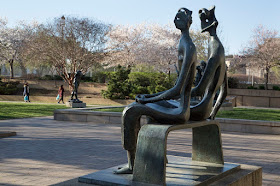“The Return” Russian
with English subtitles. Filmed on and around Lake Ladoga and the Gulf of
Finland. In a 2016 BBC critics' poll,
The Return was ranked the 80th-greatest film of the 21st century. Anyway, wow….this
is a beautifully filmed movie with a harsh, unapologetic story. Its about a lot of things, fathers and sons,
brothers, children of divorce, childhood, masculinity …..there’s a lot here. Wonderfully structured and emotionally
wrenching, the story leaps from something seemingly unexceptional at the start
into urgent mystery.
The child actor Vladimir Garin
(The older brother) drowned two months before the film's debut.
Synopsis: In
contemporary Russia, Ivan and his older brother Andrei have grown a deep
attachment to each other to make up for their fatherless childhood. Both their
mother and grandmother live with them. After running home after a fight with
each other, the boys are shocked to discover their father has returned after a
12-year absence. With their mother's uneasy blessing, Ivan and Andrei set out
on what they believe will be a simple fishing vacation with him. Andrei is
delighted to be reunited with their father and Ivan is apprehensive towards the
man whom they know only from a faded photograph. At first, both brothers are
pleased with the prospect of an exciting adventure, but they soon strain under
the weight of their father's awkward and increasingly brutal efforts to make up
for the missing decade. Ivan and Andrei find themselves alternately tested,
rescued, scolded, mentored, scrutinized, and ignored by the man. Andrei seems
to look up to his father while Ivan remains stubbornly defensive. As the truck
stops and cafés give way to rain-swept, primeval wilderness coastline, Ivan's
doubts give way to open defiance. Andrei's powerful need to bond with a father
he's never known begins, in turn, to distance him from Ivan. Ivan and his
father's test of will escalates into bitter hostility and sudden violence after
the trio arrives at their mysterious island destination.
"Change in the Air" is a
sweet little film but it tends to drag towards the middle and the end because
the script (although the concept is great) just isn’t very good. Its dull. I
think the purpose of the making this film was create a movie with a soul, but
there’s no soul here, in fact, there’s no there, there. The acting is good,
no, the acting is great because the cast is incredible, M. Emmet Walsh, Mary
Beth Hurt, Peter Gerety, Aiden Quinn.
Synopsis: Wren, a mysterious young woman) moves into a
small town where no one can hide from the nosy neighbors. When Walter next door
walks deliberately into the path of an oncoming car, Wren witnesses the
accident and calls 911, saving his life. However, once a local cop () arrives
on the scene, she is nowhere to be found. Word spreads around town to everyone,
including Jo Ann & Arnie Bayberry and Donna about Wren. The town's
curiosity only grows when the local mailman starts delivering bags of letters
to her door every day. Jo Ann's vigil on Walter's lawn quickly expands along with
her fascination with Wren. In discovering Wren's secrets, Jo Ann witnesses a
series of small miracles that unfold and shake up life in the quiet town. This
story embraces the imperfections that make us human, offers a way to set
ourselves free and asks us all to take a good, long look at the wild birds in
the sky.
“The Unicorn Store”….um,
truthfully, I turned it off because life to short to spend time on weak, silly
films like this, Again, as it was with “Change in the Air” the acting is
wonderful (especially by Samuel L. Jackson, Joan Cusack, Bradley Whitford and Mamoudou
Athie) In fairness the film does get reasonably good elsewhere, but it just
fell flat with me.
Synopsis: Kit, a
failed artist, moves back in with her parents and takes a temp job at a PR
agency. At work, Kit meets the vice president of the company, Gary, who is
extremely awkward and makes inappropriate advances towards her. Shortly after
starting the job, Kit receives a mysterious letter from "The
Salesman" who invites her to "The Store," the place that sells
"what you need." The Salesman offers Kit the chance to fulfill her
childhood fantasy of owning a unicorn. Kit must prepare for ownership of a
unicorn by meeting specific requirements detailed in files given to her by the
Salesman.

















